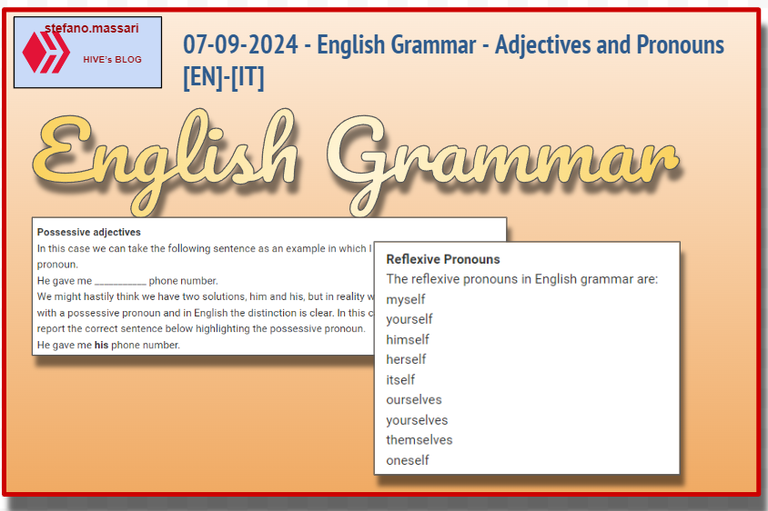07-09-2024 - English Grammar - Adjectives and Pronouns [EN]-[IT]

~~~ La versione in italiano inizia subito dopo la versione in inglese ~~~
ENGLISH
07-09-2024 - English Grammar - Adjectives and Pronouns [EN]-[IT]
With this post I would like to give a short instruction about the topic mentioned in the subject
(code notes: X500)
Adjectives and Pronouns
In English grammar we have a clear division regarding adjectives and pronouns. This division is listed below.
1-Subject Pronouns
I
you
he
she
it
we
they
2-Possessive Adjectives
my
your
his
her
its
our
their
3-Possessive Pronouns
mine
yours
his
hers
_
ours
theirs
Note that its has no reflexive pronoun
Subject Pronouns
The possessive adjectives in English (also called 'possessive determiners') are: my, your, his, her, its, our and their. Possessive adjectives indicate to whom something belongs.
Example:
Let's take the following sentence as an example without inserting the possessive adjective
This is ____________ favourite song. Do you like it?
We might have doubts about whether to use mine or my, but in this case the sentence indicates a can on someone's part, so the adjective to use is MY. Below is the sentence with the adjective highlighted.
This is my favourite song. Do you like it?
Possessive adjectives
In this case we can take the following sentence as an example in which I will omit the possessive pronoun.
He gave me ___________ phone number.
We might hastily think we have two solutions, him and his, but in reality we are unequivocally faced with a possessive pronoun and in English the distinction is clear. In this case we must use HIS. I report the correct sentence below highlighting the possessive pronoun.
He gave me his phone number.
Possessive Pronouns
As for an example of a possessive pronoun, we can take the following example.
That beautiful house over there is ___________.
In this case, we might have doubts whether to use theirs or their. Their is a possessive adjective, it is not a possessive pronoun, so in this sentence we must use the word theirs. The sentence with the highlighted possessive pronoun will be the following:
That beautiful house over there is theirs.
Reflexive Pronouns
The reflexive pronouns in English grammar are:
myself
yourself
himself
herself
itself
ourselves
yourselves
themselves
oneself
Here too, we can make an example. Let's look at the following sentence in which I will omit the reflexive pronoun.
We had a great holiday. We enjoyed _______________.
We might have doubts whether to use the term ourself or ourselves. In this sentence, grammatically, we must use a reflexive pronoun and English grammar tells us that it is ourselves.
So below I report the sentence with the correct and highlighted reflexive pronoun.
We had a great holiday. We enjoyed ourselves.
Conclusions
Reflexive pronouns end in -self or -selves depending on whether they are singular or plural. All personal pronouns, including the impersonal pronoun "one", have a reflexive form.
Question
Do you find the use of possessive adjectives in the English language complicated?

[ITALIAN]
07-09-2024 - Grammatica inglese - Aggettivi e pronomi [EN]-[IT]
Con questo post vorrei dare una breve istruzione a riguardo dell’argomento citato in oggetto
(code notes: X500)
Aggettivi e pronomi
Nella grammatica inglese abbiamo una divisione chiara per quanto riguarda aggettivi e pronomi. Questa divisione è elencata qui sotto.
1-Pronomi soggetto
I
you
he
she
it
we
they
2-Aggettivi possessivi
my
your
his
her
its
our
their
3-Pronomi possessivi
mine
yours
his
hers
_
ours
theirs
Notiamo che its non ha pronome riflessivo
Pronomi soggetto
Gli aggettivi possessivi in inglese (chiamati anche 'determinanti possessivi') sono: my, your, his, her, its, our e their. Gli aggettivi possessivi indicano a chi appartiene qualcosa.
Esempio:
Prendiamo come esempio la seguente frase senza inserire l'aggettivo possessivo
This is ____________ favourite song. Do you like it?
Potremmo avere dei dubbi se usare mine o my, ma in questo caso la frase indica un posso da parte di qualcuno, quindi l'aggettivo da usare è MY. Qui di seguito la frase con l'aggettivo evidenziato.
This is my favourite song. Do you like it?
Aggettivi possessivi
In questo caso possiamo prendere come esempio la seguente frase in cui ommetterò il pronome possessivo.
He gave me ___________ phone number.
Frettolosamente potremmo pensare di avere due soluzioni, him e his, ma in realtà siamo davanti in modo inequivocabile ad un pronome possessivo ed in inglese la distinzione è netta. In questo caso dobbiamo usare HIS. La frase corretta la riporto qui sotto evidenziando il pronome possessivo.
He gave me his phone number.
Pronomi possessivi
Per quanto riguarda un esempio di pronome possessivo possiamo prendere il seguente esempio.
That beautiful house over there is ___________.
In questo caso potremmo avere dei dubbi se usare theirs o their. Their è un aggettivo possessivo, non è un pronome possessivo, quindi in questa frase dobbiamo usare la parola theirs. La frase con il pronome possessivo evidenziato risulterà la seguente:
That beautiful house over there is theirs.
Pronomi riflessivi
I pronomi riflessivi della grammatica inglese sono:
myself
yourself
himself
herself
itself
ourselves
yourselves
themselves
oneself
Anche qui possiamo fare un esempio. Vediamo la seguente frase in cui ommetterò il pronome riflessivo.
We had a great holiday. We enjoyed _______________.
Potremmo avere de dubbi se usare il termine ourself oppure ourselves. In questa frase, a livello grammaticale dobbiamo usare un pronome riflessivo e la grammatica inglese ci dice che è ourselves.
Quindi qui di seguito riporto la frase con il pronome riflessivo giusto ed evidenziato.
We had a great holiday. We enjoyed ourselves.
Conclusioni
I pronomi riflessivi terminano in -self o -selves a seconda che siano singolari o plurali. Tutti i pronomi personali, incluso il pronome impersonale "one", hanno una forma riflessiva.
Domanda
Vi sembrano complicato l'uso degli aggettivi possessivi nella lingua inglese?
THE END
I’m very much familiar with this course
I studied English at the University and you’re totally right about all of these
Thank you
https://x.com/lee19389/status/1832517692030353619
#hive #posh
No, quel che semmai è davvero complicato (e non a caso richiede infatti studi universitari), ma in qualsiasi lingua straniera, sarebbe l'illustrare agli studenti cosa distingue un pronome da un aggettivo, specie nei possessivi e dimostrativi, poi quali le tipologie di aggettivi (qualificativi, numerali, indefiniti, dimostrativi, ecc.), pronomi (idem come sopra), congiunzioni (idem come sopra), avverbi (idem come sopra), preposizioni, reggenza verbale e nominale, uso corretto dei tempi verbali, specie tra proposizione principale e le sue subordinate, insomma...purtroppo nei corsi di lingue moderni la grammatica ha finito con il ricoprire un ruolo del tutto secondario, peggiorato dalla mancanza di traduzione nella lingua degli studenti. Vero è che con questo metodo moderno si apprende a interagire velocemente nelle conversazioni, ma quand'è ora di trovare lavoro all'estero (diverso dal pulire cessi🤣), il risultato è:
 
!LOLZ
English language is very lovely
Thank you for this topic
It’s easy
Very soon, I am actually planning to take a English course so that I can sharpen my vocabulary skills